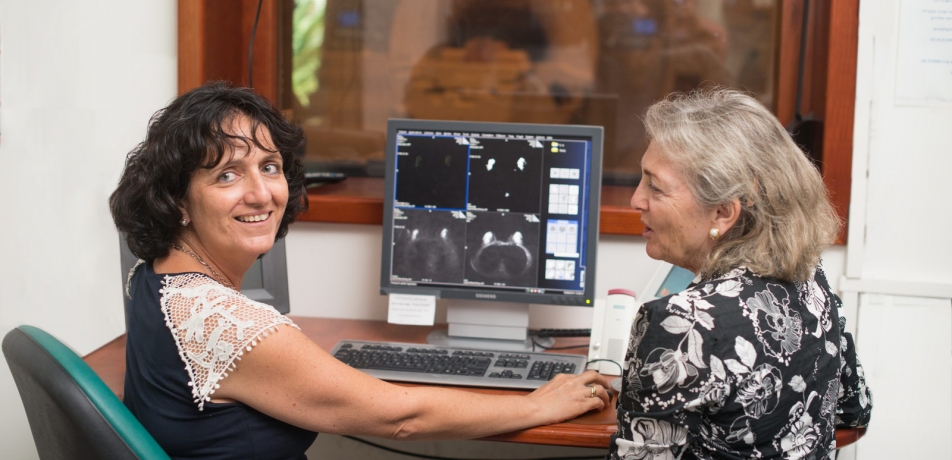Imaging for the future
Dr. Edna Furman-Haran
People behind the science

Early detection of breast cancer can be the key to survival and optimal quality of life for breast cancer patients, and Dr. Edna Furman-Haran is among the pioneers using magnetic resonance imaging to improve early detection.
A staff scientist in the Life Sciences Core Facilities (LSCF), her expertise is in magnetic resonance imaging and, as head of the Institute’s Human Magnetic Resonance Imaging (MRI) Unit, her work has led her into other areas of exploration, mainly in brain research.
A 16-year veteran of the Weizmann Institute, Dr. Furman-Haran worked in her earliest days here with Prof. Hadassah Degani in the Department of Biological Regulation (pictured above, right, with Dr. Furman-Haran) on new noninvasive breast cancer detection methods. With Prof. Degani, she advanced the development of the U.S. Food and Drug Administration (FDA)-approved Three-Time-Point (3TP) method for breast cancer diagnosis. Later, she was the lead investigator in studies that extended the use of the 3TP method to prostate cancer.
Dr. Furman-Haran also worked with Prof. Degani to develop magnetic resonance diffusion tensor imaging (DTI) methods to track mammary structure, quantify diffusion properties, and detect breast malignancy. Currently, mammography is the common method for screening, with magnetic resonance imaging (MRI) serving as an adjunct for screening high-risk patients. However, mammography of dense breasts is limited, and standard breast MRI protocols involve injecting a contrast agent and are of limited specificity.
Their joint work continues today. The completely non-invasive imaging approach gives high-detection and diagnostic accuracy, particularly in dense breast tissue, offering a safe and sensitive alternative for breast cancer detection. Clinical trials are underway with collaborators in Spain and Canada.
Her role today mainly involves collaborating with neuroscientists, helping them design, conduct, and optimize experiments that further the understanding of brain anatomy, function, and physiology. She also trains students in the use of the MRI scanner and the LSCF’s equipment infrastructure.
Dr. Furman-Haran is the first incumbent of the Calin and Elaine Rovinescu Research Fellow Chair for Brain Research, one of a series of RFC chairs established recently by generous donors to advance the careers—and key areas of scientific investigation - of staff scientists. She says she is grateful to the Rovinescu family and friends for their support. By endowing this chair, she says, “the Rovinescus are significantly strengthening not only the Weizmann Institute’s neuroscience program, but also other areas of research involving biomedical imaging.”
Mr. Calin Rovinescu, CEO of Air Canada, was one of Weizmann Canada’s Ten Leading Men honored at the National Gala. He was also named Canada’s 2017 CEO of the Year®. Calin says he has great respect for the work of the Weizmann Institute’s research in neuroscience, which he considers “an important frontier.” In explaining why he chose to support an RFC in neuroscience, “We haven’t yet cracked how the brain works,” he says. “MRI technology has a tremendous number of applications, from understanding emotions to applications to commerce.” He is especially interested in the Institute’s efforts to uncover how to protect the brain, preserve memories, and apply neuroscience concepts to economics and machine learning.
The brain in high-definition
Dr. Furman-Haran was recently involved in a significant infrastructure acquisition: the ultra-high-field 7-Tesla (T) MRI system. This system will serve as the centerpiece of the Institute’s new Azrieli Center for Brain Imaging and Research, a national center serving the entire Israeli scientific community. The high-resolution 7T MRI scanner will allow scientists to acquire and visualize anatomical, functional, and metabolic brain imaging data in three dimensions at previously unattainable spatial resolution and precision.
“The 7T MRI system will not only give us much greater spatial resolution, but it will also enable us to achieve a much more precise correlation of brain function with brain structures, study connectivity of white matter neuronal fibers, and find markers of disease,” she says. “As improved resolution and contrasts become available, the system opens up incredible new imaging and spectroscopy research possibilities, which will allow us to ask new questions and conduct new tests.”
The Weizmann Institute’s 7T MRI will be the first such instrument in Israel and one of only about 60 in operation worldwide.
Dr. Edna Fuhrman-Haran is the incumbent of the Calin and Elaine Rovinescu Research Fellow Chair for Brain Research
Prof. Degani is the incumbent of the Fred and Andrea Fallek Professorial Chair in Breast Cancer Research.
